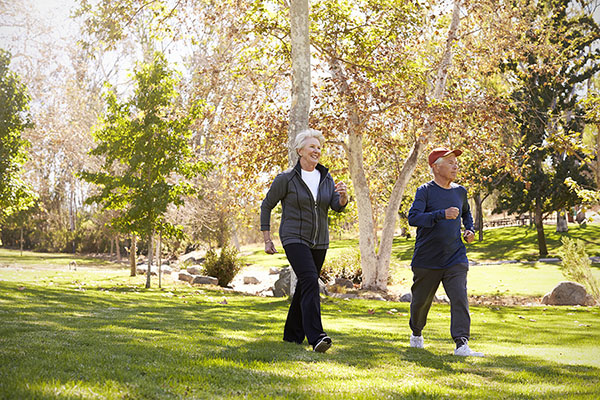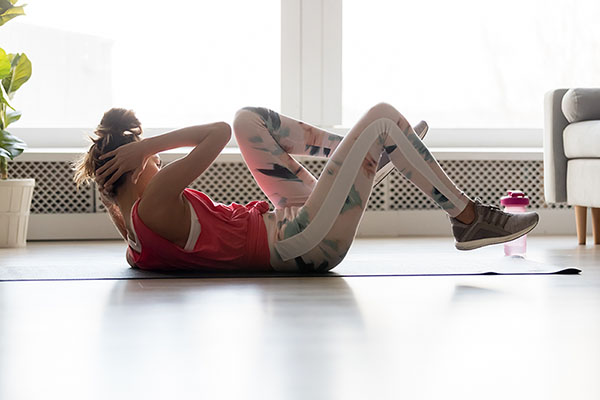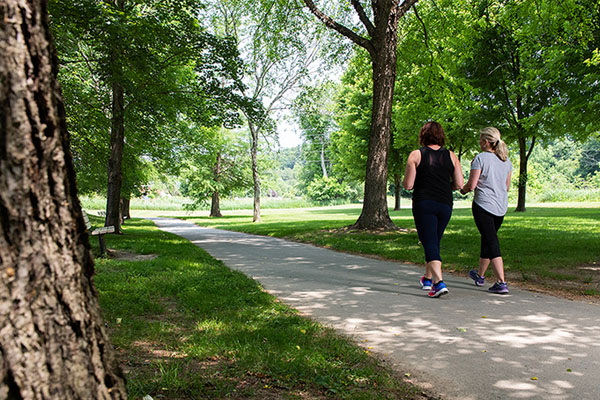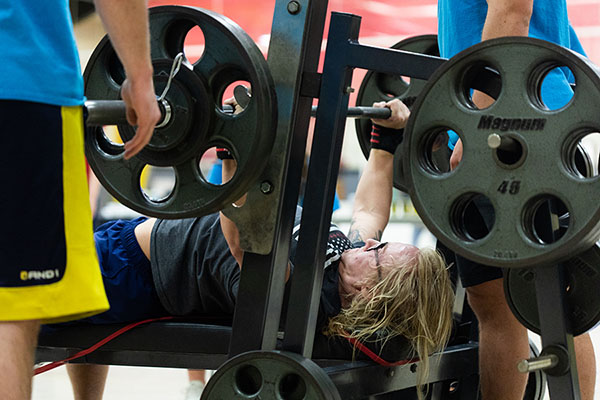BOONE, N.C. — With the threat of COVID-19 continuing into winter, having an exercise routine is important for staying healthy and keeping our immune systems in good shape for a vaccine, according to an Appalachian State University exercise scientist.
Numerous studies have shown being active has positive impacts on both mental and physical health, said App State’s Dr. Rebecca “Becki” Battista, an Exercise Is Medicine Ambassador and a board member of the Physical Activity Alliance. Battista teaches in the Beaver College of Health Sciences’ Department of Health and Exercise Science.
“Because the pandemic has changed many of our lives, it is now more important than before to be active. Being physically active decreases anxiety and risk of depression, which may occur in the winter months and may be fairly high during the pandemic. It also improves our immune system and has been suggested to improve the immune system’s response to a vaccination,” she said, citing research published in the journal Brain, Behavior and Immunity.
Any amount of physical activity helps, she said — “even 10-minute bouts sprinkled throughout the day.” The point is to decrease the amount of time spent in sedentary activities such as working on a computer or watching television.
She recommends following the Centers for Disease Control and Prevention’s Physical Activity Guidelines for adults: at least 150 minutes of moderate-intensity activity a week; and, if you can handle more intense activity, 75 minutes of vigorous-intensity activity a week.
7 tips for staying active
Battista suggests these seven ideas for how to work small bouts of physical activity into your day to break up the time you spend sitting:
- Set a timer on your phone or watch for 30 minutes, and then stand up, get a glass of water, look out the window or walk around the room.
- Take laps around the house and reverse directions.
- Use the stairs whenever possible.
- Find workouts on YouTube and do them with a friend or family member. Many fitness facilities are offering virtual group fitness classes, including App State’s University Recreation, which also offers in-person classes. Check your local fitness center for other resources. Numerous options are available online.
- Create step challenges with family or friends. Select a long distance trail, like the Mountains-to-Sea Trail — 1,175 miles across North Carolina — and challenge each other to cover that distance by August. About 2,000 steps equal 1 mile, Battista said, or keep track using a fitness app or other form of technology.
- Try yoga — a great activity that can be done indoors.
- Add strength training activities to your routine. These could include light hand weights or resistance bands — anything that can provide resistance for your muscles. Battista said one creative student used containers of laundry detergent as weights in her home.
“Develop an exercise plan and find an accountability partner. This way, you can work out together and share each other’s goals, successes and failures,” Battista said. The Move Your Way Activity Planner can be a helpful resource for scheduling activity, she added.
Tips for exercising outdoors in winter
More than three-quarters of U.S. adults say it is important for people to have access to outdoor amenities to continue or create new family traditions, according to a survey this fall by the National Recreation and Park Association (NRPA). The organization recommends using picnic areas, local parks, campgrounds and pavilions as places where families and close friends can safely gather, enjoy fresh air and spend quality time together.
In fact, exercising at home may not be adequate or feasible for certain segments of the population due to limited space or other factors, according to a July article co-authored by App State’s Dr. Richard W. Christiana and published in the journal Preventing Chronic Disease. Both Christiana and Battista are team members in App State’s Healthy Outdoor Play and Exercise (HOPE) Lab.
In the mountains, “many of your favorite places to hike in the summer can be quite amazing in the winter, as the leaves are gone and the views are spectacular,” Battista said. “Just check the weather and be sure the trail is open before heading out.”
Being active outside does require being smart about your clothing choices, she said:
- Dress in layers.
- Keep your head and ears warm.
- Keep your hands and feet warm and dry. Wool socks help keep your feet dry. Mittens tend to work better than gloves to keep your fingers warm.
Battista said recent evidence suggests being in nature, or even looking out a window at natural settings, can be restorative and improve mental health. If you’re looking for places to go to get outside in your area, consider the Park Rx America website, the Blue Ridge Parkway trails or area ski slopes and skating rinks.
What do you think?
Share your feedback on this story.
About the Beaver College of Health Sciences
Appalachian State University’s Beaver College of Health Sciences (BCHS), opened in 2010, is transforming the health and quality of life for the communities it serves through interprofessional collaboration and innovation in teaching, scholarship, service and clinical outreach. The college enrolls more than 3,600 students and offers 10 undergraduate degree programs, nine graduate degree programs and four certificates across seven departments: Kinesiology, Nursing, Nutrition and Health Care Management, Public Health, Recreation Management and Physical Education, Rehabilitation Sciences, and Social Work. The college’s academic programs are located in the Holmes Convocation Center on App State’s main campus and the Levine Hall of Health Sciences, a state-of-the-art, 203,000-square-foot facility that is the cornerstone of Boone’s Wellness District. In addition, the college supports the Appalachian Institute for Health and Wellness and has collaborative partnerships with the Wake Forest University School of Medicine’s Physician Assistant Program, UNC Health Appalachian and numerous other health agencies. Learn more at https://healthsciences.appstate.edu.
About Appalachian State University
As a premier public institution, Appalachian State University prepares students to lead purposeful lives. App State is one of 17 campuses in the University of North Carolina System, with a national reputation for innovative teaching and opening access to a high-quality, cost-effective education. The university enrolls more than 21,000 students, has a low student-to-faculty ratio and offers more than 150 undergraduate and 80 graduate majors at its Boone and Hickory campuses and through App State Online. Learn more at https://www.appstate.edu.






![The Search for Vertical Grasslands [alumni featured]](/_images/_posts/2026/03/vertical-grasslands-600x400.jpg)




![How NCInnovation Is Rethinking Economic Development in North Carolina [faculty featured]](/_images/_posts/2026/02/rethinking-economic-development-600x400.jpg)





